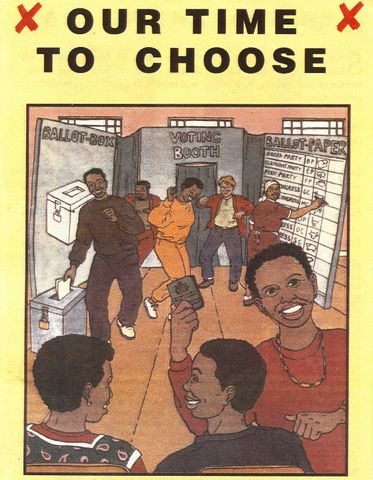Symposium
Economy, Community and Sustainability
Discussion with Nomboniso Gasa and Mzukisi Qobo, moderated by Jule Reimer
with simultaneous translation into English and German

From housing to health and energy, the apartheid regime left a legacy of inequality and infrastructural deficit. In spite of the remarkable growth South Africa experienced from 1998 to 2008, it remains one of the most unequal countries in the world. A sustainable future depends on coping with the multiple vulnerabilities of South Africa´s economy. How can the country achieve a more inclusive growth? What is and could be the role of informal economies? How successful is Black Economic Empowerment? What can be done to face the growing concerns about climate change? And what are the challenges for South Africa’s development in a globalized economy?
Mzukisi Qobo teaches International Political Economy at the University of Pretoria, and is deputy director of the Centre for the Study of Governance Innovation (GovInn) at the same university. His main research focus at the centre is on the role of emerging powers in global govervance, as well as Africa’s political economy. Mzukisi has previously served as chief director at the Department of Trade and Industry (DTI) where he was responsible for developing South Africa's trade policy. In the past he has fulfilled a role as head of Emerging Powers and Global Challenge at the South African Institute of International Affairs (SAIIA). He has also played an advisory role in the corporate sector, especially in the mining and finance sectors. He is co-author of the book: “The Fall of the ANC: What Next?” He obtained his PhD from the University of Warwick, United Kingdom.
Nomboniso Gasa is a political analyst, public speaker on gender, politics and culture and a Senior Research Associate at the Centre for Law and Society of the law faculty of the University of Cape Town. Her focus is on the intersection of land, living custom, the construction of identities and traditional leadership. In the 1990s, she was executive secretary responsible for policy development in the ANC's Commission on the Emancipation of Women. She was closely involved in the ANC's decisive contribution to the negotiation of a new constitution, focusing specifically on gender equality. Gasa headed the International Institute for Democracy and Electoral Assistance (I-IDEA) in Nigeria. She conceptualized and drove a massive research program with Nigerian and international scholars. This culminated in a book published by I-IDEA “Democracy in Nigeria: Continuing Dialogue(s) for Nation Building” and multi stakeholder policy dialogues, including politicians, academics, senior religious leaders and civil society. The publication is treated by many Nigerians, other scholars and analysts as seminal work on many contemporary Nigerian issues. Further, her publications include “Women in South African History” (2007, HSRC Press). As an art critic, she has published essays in catalogues and written in popular media. Gasa has been a political activist since her teenage years, which led to her first detention without trial and her torture at the age of 14 in the former Transkei.
Jule Reimer works as an editor for the economics and society department at Deutschlandfunk. She worked as a freelance journalist and ARD-radio correspondent in Brazil and southern Africa (particularly South Africa, Angola, and Mozambique) and reported on the wars in the Balkans. Reimer received a degree in political economy from the University of Cologne, where she also minored in Portuguese. She received her journalistic training at the Kölner Journalistenschule and as a trainee at Deutsche Welle.